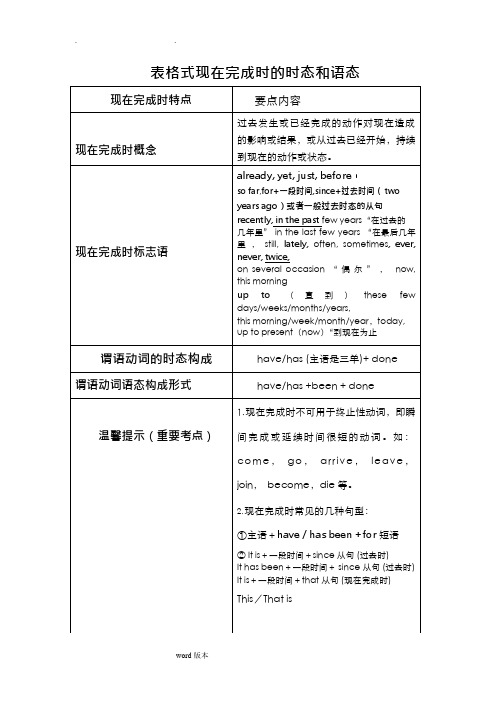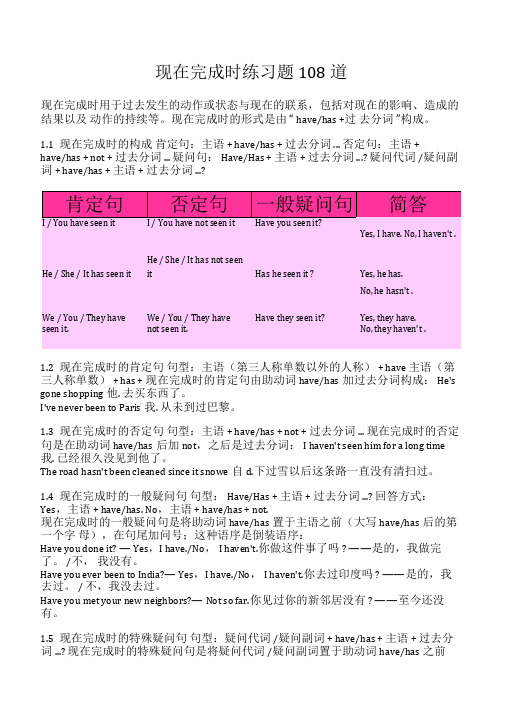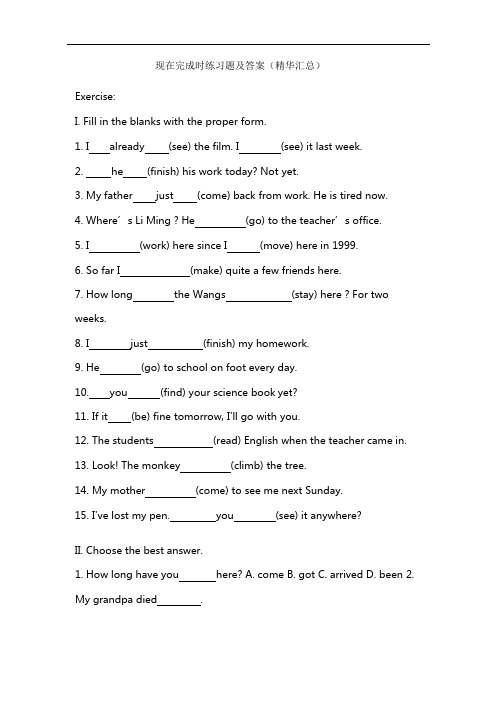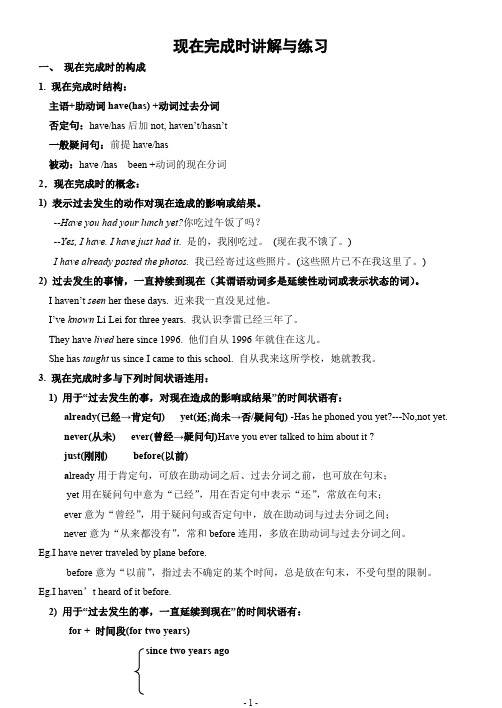(word完整版)高中现在完成时及其练习
高中现在完成时与练习题(可编辑修改word版)

表格式现在完成时的时态和语态温馨提示:过去分词规则的和一般过去时态的动词变化规则一样,动词结尾+ed。
不规则的要逐个记忆不规则:go-went(过去式)---gone(过去分词)如规则的: play---played(过去式)--played(过去分词)The countryside has changed a lot in the past few years.is\am fly beginare play godrink work makepass doesdance worry asktasteeat draw put一、详解现在完成时的常见的标志语和词组,特殊结构的用法1.九个重点标志语的用法①already 已经肯定句中或句尾I have already found my pen. = I have found my pen already.②yet 已经否定句和疑问句句尾I have not finished the work yet. Have you bought a computer yet?③ever 曾经句中Have you ever seen pandas?④never 从不句中I have never been to Beijing.⑤just 刚刚句中I have just done my work.⑥before 以前句尾I have never been there before.⑦so far 到目前为止So far he has learnt 200 words.⑧how long 多久How long have you lived here?⑨how many times 多少次How many times has he been to Beijing?2、三词组用法区别:(1)have<has>gone to“去了某地”,主语不在说话现场,通过“Where is Tom”,或者“My father isn’t in/at home.”来体现。
(完整版)现在完成时练习题108道(附答案)

现在完成时练习题108 道现在完成时用于过去发生的动作或状态与现在的联系,包括对现在的影响、造成的结果以及动作的持续等。
现在完成时的形式是由“ have/has +过去分词”构成。
1.1现在完成时的构成肯定句:主语+ have/has + 过去分词... 否定句:主语+have/has + not + 过去分词... 疑问句:Have/Has + 主语+ 过去分词...? 疑问代词/疑问副词+ have/has + 主语+ 过去分词...?肯定句否定句一般疑问句简答I / You have seen it I / You have not seen it Have you seen it?Yes, I have. No, I haven't .He / She / It has seen it He / She / It has not seenit Has he seen it ? Yes, he has.No, he hasn't .We / You / They have We / You / They have Have they seen it? Yes, they have.seen it. not seen it. No, they haven't .1.2现在完成时的肯定句句型:主语(第三人称单数以外的人称)+ have 主语(第三人称单数)+ has + 现在完成时的肯定句由助动词have/has加过去分词构成:He's gone shopping他. 去买东西了。
I've never been to Paris我. 从未到过巴黎。
1.3现在完成时的否定句句型:主语+ have/has + not + 过去分词... 现在完成时的否定句是在助动词have/has后加not,之后是过去分词:I haven't seen him for a long time 我. 已经很久没见到他了。
完整word版,高中英语现在完成时态练习(含答案)好,推荐文档

用所给词的适当形式填空1.All the furniture in the building _______ (belong)to the company not to his own..2. When I was at college I _______(speak) three foreign languages, but I _______(forget) all except a few words of each.3. -----We would have walked to the station. It was so near.----- Yes, a taxi _______(be) at all necessary.4. I don’t really work here. I _______ (just help out)until the new secretary arrives.5. He _______(break) his leg when he _______(play) in a football match.6. The new secretary is supposed to report to the manager as soon as she _______(arrive).7. As she _______ (read)newspaper, Granny _______ (fall)asleep.8. ---Do you like the material?---Yes, it _______ (feel)very soft.9. ---Come on in, Tom. I want to show you something.--- Oh, how nice of you! I _______(think) you _______(go) to bring me a gift.10. ----You’ve agreed to go, so why aren’t you getting ready?---But I _______ (realize)that you _______(want) us to start at once.11. The house is dirty. We _______(clean)it for weeks.12. -----_______ (I tell) the sports meet might be put off.---- Yes, it all depends on the weather.13. ---- I’m sorry to keep you waiting.----Oh, not at all. I _______ (be) here only a few minutes.14. You don’t need to describe her. I _______(meet) her several times.15. The cost of living _______ (go up)by ten percent before the government took any action.16. By the time new pupil _______(gather) enough courage to raise his hand , the bell for the end of thelesson _______(ring).17. -----Did you go to Beijing for vacation ?-----I _______(plan) to go , but I got sick at the last minute.18. ------When will they leave ?------They _______(leave) very soon .19. ------Was he studying for an exam ?------Yes , he's _______ it next week.20. ------Are there going to be many people at your party today ?------We hope that _______(there be go).21. She must have arrived there last night , _______ (do/have/need/must)she ?22. _______ the letter , I ran out of the room to the post office.23. Twelve inches _______ (make) one foot.24. I _______ (think of )going to London next month.25. He _______ (study) English for six years by the time he takes his examination.26. By this time next year he _______ (graduate)from this college.27. _______ (hardly I reach)the school when the bell rang.28. He promised us that he _______ (be动) early but he _______(arrive) yet.29. The teacher told the pupils that the earth _______(be) round.30. The moment they met , they knew that _______ (they frends).31. We _______ (discuss) the problem for quite some time , but we _______ (reach) any conclusion yet.32. It wasn't until two o'clock that I _______ (go) to sleep.33. ------Where _______ (you put)my book ? I can't see it anywhere.------ I _______ (put) it on this table . But now it's gone .34. Perhaps it will be a long time _______(Tom come back) from abroad.35. If the film _______ (show)is our school , we'll go and see it .36. -----How _______ (you get)on with your English these days .-----Not bad.37. -----What _______(you do) when I phoned you this morning?------I _______ (just finish)my homework and was starting to take a boat.38. I _______ (never read)such an interesting book before.39. _______that the earth was the centre of the universe.A People were believingB It was once believed40. Two of the boys _______ (hurt)while playing football.41. Prices _______ (rise)sharply in the past few years.42. The number of the students in our school _______ (add up to)1200.43. What he said at the meeting _______ (prove)true .44. How long do you think the meeting ______(last)45. The May 4th movement ______ (take place)in 1919.46. These kinds of shoes ______ (not sell)well.47. On returning home , I found I ______ (leave)umbrella in the office.48. Once you ______ (make)a promise , you must carry it out.49. She ______ (marry)Charles for a year.50. The singer lived in California until he ______ (sent)to university.1、Belongs2、spoke, have forgotten3、wasn’t4、am just helping out5、broke, was playing6、arrives7、was reading, fell8、feels9、never thought, were going10、didn’t realize, wanted11 、haven’t cleaned12、I’ve been told13、have been14、have met 15、had gone up 16、had gathered ; was already ringing17、would gather ; would already have rung 18、had been planning 19、to take 20、there are going21、didn't 22、As soon as I finished writing 23、Makes 24、am thinking of 25、will have been studying 26、will have graduated 27、Hardly had I reached 28、would be; hasn't arrived 29、is30、they would be friends 31、have been discussing ,haven't reached 3 2、went 33、have you put34、before Tom comes back 35、is shown 36、are you getting 37、were you doing , had just finished 38、have never read 39、It was once believed 40、got hurt41、have been risen42、have added up to43、proved44、will last45、took place46、don't sell47、had left48、have made49、has been married to50、was sent。
现在完成时(含练习题及答案)

现在完成时定义:表示在过去的某个时间已经发生的行为或者曾经做过的事情对现在产生的影响和结果。
构成:have/has+动词的过去分词(done)常与以下时间状语连用,比如:1. already/yet- I have already read that book. 我已经读过那本书了。
- Flora hasn’t finished her homework yet. 弗洛拉还未完成作业。
2. just- I have just received a letter from my brother.我刚刚收到我兄弟的来信。
3. recently- I haven’t seen him recently. 我最近没见过他。
4. ever/never- Have you ever been to London? 你去过伦敦吗?- I have never been to London. 我从未去过伦敦。
5. so far- So far I have learnt to speak German, English and French.到目前为止,我已经学会了说德语,英语和法语。
6. for引导的短语表示延续的时间,延续性动词多用于此。
- We have studied English for six years. 我们已经学习英语六年了。
7. since引导的短语,或者从句- He has lived here since 1997. 自从1997年,他就住在这里。
- We haven’t seen each other since he moved to London.自从他搬去伦敦,我们就再也没见过。
8. have/has been to 与have/has gone to /has been in的区别- He has been to the Great Wall twice. 他去过长城两次。
(表示去了人已回来)- He has gone to Beijing. 他去了北京。
(完整版)现在完成时练习题及答案(可编辑修改word版)

现在完成时练习题及答案(精华汇总)Exercise:I.Fill in the blanks with the proper form.1.I already (see) the film. I (see) it last week.2.he (finish) his work today? Not yet.3.My father just (come) back from work. He is tired now.4.Where’s Li Ming ? He (go) to the teacher’s office.5.I (work) here since I (move) here in 1999.6.So far I (make) quite a few friends here.7.How long the Wangs (stay) here ? For two weeks.8.I just (finish) my homework.9.He (go) to school on foot every day.10. you (find) your science book yet?11.If it (be) fine tomorrow, I'll go with you.12.The students (read) English when the teacher came in.13.Look! The monkey (climb) the tree.14.My mother (come) to see me next Sunday.15.I've lost my pen. you (see) it anywhere?II.Choose the best answer.1.How long have you here? A. come B. got C. arrived D. been2. My grandpa died .A. at the age of my 2B. for 2 yearsC. when I was 2.D. my age was 6.3.Jane has to BeiJing. She will come back tomorrow. A. been B. gone C. went D. never been4.It is ten years I last saw her. A. after B. since C. for D. that5.-- Who will go to the station to meet Lorry? --I will. I her several times. A. met B. have met C. had met D. will meet6. --What a nice dress! How long you it?--Just 2 weeks. A. will, buy B. did, buy C. are, having D. have, had7.--Do you know Lydia very well? --Yes, She and I friends since we were very young.A. have madeB. have bec omeC. have beenD. have turnedin China for 8 years. A. has lived B. lived C. have 8.The Smithsbeen D. live9.--Hello, this is Mr. Gre en speaking. Can I speak to Mr. Black? -- Sorry. He the Bainiao Park. A. has been to B. has gone to C. went to D. will go to10.-- you ever to the US? -- Yes, twice. A. Have, gone B. Have, been C, Do, go D. were, goingIII.Rewrite the sentences.1.I have been to Macau before. (改为否定句) I been to Macau before.2. He hasn’t come to schoolbecause he was ill. (就划线部分提问) he come to school?3.I bough a new bike just now. (用just 改写)I just a new bike.4.We began to learn English three years ago.(改为同义句)We English three years5.He has never surfed, ? (改成反意疑问句)6.They have been here since 2000. (对划线部分提问)have they been here?7.The old man last year. He has for a year. (die) (动词填空)8.Miss Gao left an hour ago. (同义句转换)Miss Gao has an hour ago.Ⅳ. A sk the questions1)I have been there for two days.you ?2)My father has lived here since 2000.your father ?3)He left here yesterday.he ?4)They bought a book two hours ago.they a book?Ⅴ. Use “never, ever, already, just, yet, for, since” to fill in the blanks.1.I have seen him before, so I have no idea about him.2.Jack has finished his homework.3.Mr. Wang has taught in this school ten years.4.“Have you seen the film?” “No, I have seen it.”5.“Has the bus left ?” “Yes, it has left.”二、用since 和for 填空1.two years2.two years ago3. last month4. 19995.yesterday6. 4 o’clock 7 4 hours8. an hour ago9. we were children10. lunch time 11.she left here12.He has lived in Nanjing the year before last.13.I’ve known him we were children.14.Our teacher has studied Japanese three years.15.She has been away from the city about ten years.16.It’s about ten years she left the city.三、结束性动词转换为以下延续性动词或者表示可以延续的状态的短语。
高中现在完成时讲解与练习(非常详细)

现在完成时讲解与练习一、现在完成时的构成1. 现在完成时结构:主语+助动词have(has) +动词过去分词否定句:have/has后加not, haven’t/hasn’t一般疑问句:前提have/has被动:have /has been +动词的现在分词2.现在完成时的概念:1) 表示过去发生的动作对现在造成的影响或结果。
--Have you had your lunch yet?你吃过午饭了吗?--Yes, I have. I have just had it. 是的,我刚吃过。
(现在我不饿了。
)I have already posted the photos. 我已经寄过这些照片。
(这些照片已不在我这里了。
)2) 过去发生的事情,一直持续到现在(其谓语动词多是延续性动词或表示状态的词)。
I haven’t seen her these days. 近来我一直没见过他。
I’ve known Li Lei for three years. 我认识李雷已经三年了。
They have lived here since 1996. 他们自从1996年就住在这儿。
She has taught us since I came to this school. 自从我来这所学校,她就教我。
3. 现在完成时多与下列时间状语连用:1) 用于“过去发生的事,对现在造成的影响或结果”的时间状语有:already(已经→肯定句) yet(还;尚未→否/疑问句) -Has he phoned you yet?---No,not yet.never(从未) ever(曾经→疑问句)Have you ever talked to him about it ?just(刚刚) before(以前)a lready 用于肯定句,可放在助动词之后、过去分词之前,也可放在句末;yet用在疑问句中意为“已经”,用在否定句中表示“还”,常放在句末;ever意为“曾经”,用于疑问句或否定句中,放在助动词与过去分词之间;never意为“从来都没有”,常和before连用,多放在助动词与过去分词之间。
完整版)现在完成时专项练习题及答案(精选)
完整版)现在完成时专项练习题及答案(精选)1、Both his XXX.2、He has already been to Shanghai。
has he?3、Have you just met Mr。
Li?4、The famous writer has written one new book in the past two years.5、Our country has changed a lot so far。
Yes。
I hope it will be even better.6、Zhao Lan has already studied in this school for two years.7、We have known Xiao Li since she was a little girl.8、XXX is a very nice film。
I have seen it twice.9、These farmers have been to the United XXX。
When did they go there?10.Have you finished your homework yet。
Yes。
I just finished it a moment ago.11.His father has been a member of the Party since 1978.12.Yes。
we have been friends for ten years.13.How long have you been here。
About two months.14.Hurry up。
The play has been on for ten minutes.15.It has been ten years since he left the army.16.Miss Green isn't in the office。
高一现在完成时讲解及练习(含答案)
现在完成时讲解及练习(含答案)一.基本结构:助动词have/has+过去分词(done)二.句型:否定句:主语+have/has+not+过去分词+其他.一般疑问句:Have/Has+主语+过去分词+其他.简略答语: Yes, 主语+ have/has.(肯定) No, 主语+ haven't/hasn't.(否定)三.用法(1)现在完成时表示过去发生或已经完成的动作对现在造成的影响或结果I have spent all of my money (so far). (含义是:现在我没有钱花了.)Guo zijun has (just/already) come. (含义:郭子君现在在这儿)My father has gone to work.(含义是:我爸爸现在不在这儿)(2)现在完成时可以用来表示发生在过去某一时刻的,持续到现在的动作(用行为动词表示)或状态(be动词表示)常与for(+时间段),since(+时间点或过去时的句子)连用.①for+时段②since+过去一个时间点(译为:自从……以来)③since+时段+ago④since+从句(过去时)●⑤It is+时段+since+从句(过去时)Mary has been ill for three days.I have lived here since 1998.四.has gone (to),has been (to), has been (in) 的区别Have/Has gone(to) :去了(现在不在说话现场)Where is your father?He has gone to Shanghai.Have/Has been (to) :去过(已不在去过的地方)My father has been to Shanghai.Have/has been in:呆了多久(还在所呆的地方)My father has been in Shanghai for two months. /since two months ago.五.现在完成时的标志1. 现在完成时的含义之一是过去完成的动作对现在仍有影响,用以下四大标志词可以表达这种含义:* 以already, just和yet为标志He has already got her help. 他已得到她的帮助。
高中英语现在完成时练习题及答案
高中英语现在完成时练习题及答案一、单项选择—Have you ever been to Beijing?—No, I _.A. didn't goB. haven't beenC. haven't goneD. wasn't goingI _ my homework yet. I'll do it right away.A. don't finishB. didn't finishC. haven't finishedD. hadn't finishedThe movie is great. I _ it twice.A. watchedB. have watchedC. had watchedD. watch—Do you know where my keys are?—I'm not sure. I _ seen them.A. haven'tB. didn'tC. hadn'tD. don't—How many times _ to the park this month?—Twice.A. did you goB. have you goneC. had you goneD. will you go二、用现在完成时完成下列句子I (read) three books this month.I have read three books this month.We (not finish) the project yet.We haven't finished the project yet.She (be) to Paris twice.She has been to Paris twice.They (not see) each other for two years.They haven't seen each other for two years.He (just arrive) at the airport.He has just arrived at the airport.Choose the correct form of the present perfect tense:a) I (have/had) breakfast already.b) She (have/has) finished her homework.c) We (has/have) watched that movie before.Answers:a) I have breakfast already.b) She has finished her homework.c) We have watched that movie before.Rewrite the following sentences using the present perfect tense: a) I ate breakfast this morning.b) She watched a movie last night.c) They visited their grandparents last weekend.Answers:a) I have eaten breakfast this morning.b) She has watched a movie last night.c) They have visited their grandparents last weekend.Fill in the blanks with the correct form of the present perfect tense:a) I ___ (lose) my keys.b) They ___ (move) to a new house.c) He ___ (study) for three hours.Answers:a) I have lost my keys.b) They have moved to a new house.c) He has studied for three hours.Complete the following sentences with the correct present perfect tense form of the verbs in brackets:a) She ___ (not finish) the project yet.b) We ___ (never see) that movie before.c) He ___ (already eat) dinner.Answers:a) She has not finished the project yet.b) We have never seen that movie before.c) He has already eaten dinner.Choose the correct sentence using the present perfect tense:a) I have seen that movie yesterday.b) They have been to Japan last year.c) She has lived in New York for five years.Answer: She has lived in New York for five years.Choose the correct form of the verb to complete the sentences in the present perfect tense.a) We (go/ have gone) to Paris several times.b) She (write/ has written) a novel.c) They (see/ have seen) that movie before.d) He (eat/ has eaten) sushi before.e) I (meet/ have met) my favorite author.Answer:a) have goneb) has writtenc) have seend) has eatene) have metRewrite the following sentences in the present perfect tense.a) He travelled to Japan last year.b) Sarah played soccer when she was younger.c) We studied Spanish for four years.d) They visited their grandparents over the weekend.e) I ate breakfast an hour ago.Answer:a) He has travelled to Japan.b) Sarah has played soccer.c) We have studied Spanish for four years.d) They have visited their grandparents over the weekend.e) I have eaten breakfast an hour ago.Fill in the blanks with the correct form of the verb in the present perfect tense.a) I _ (not finish) my homework yet.b) She _ (already see) that movie.c) We _ (just arrive) at the airport.d) They _ (never try) sushi before.e) He _ (not decide) which college to attend.Answer:a) have not finishedb) has already seenc) have just arrivedd) have never triede) has not decidedComplete the following dialogue using the present perfect tense.A: Have you ever been to New York City?B: Yes, I (go) there a few years ago.A: _ (you like) it?B: Yes, I _ (have) a great time. The food was amazing.A: That's great. _ (you visit) any museums or landmarks?B: Yes, I _ (see) the Statue of Liberty and the Empire State Building. Answer:B: Yes, I went there a few years ago.A: Did you like it?B: Yes, I had a great time. The food was amazing.A: That's great. Did you visit any museums or landmarks?B: Yes, I saw the Statue of Liberty and the Empire State Building.。
(完整版)现在完成时讲解(含讲解及习题)(可编辑修改word版)
(完整版)现在完成时讲解(含讲解及习题)(可编辑修改word版)现在完成时讲解一、构成:肯定式:主语+ 助动词have/has + 动词的过去分词.疑问式:助动词Have/Has + 主语+ 动词的过去分词?否定式: 主语+ 助动词have/has + not + 动词的过去分词.过去分词规则变化:a)一般情况下,直接加ed, (work---worked,water---watered, finish---finished 等;)b)以“辅音字母+ y”结尾的动词, 把y 变成i 再加ed, (carry-- -carried study---studied 等;)c)以辅+元+辅结尾且中读的动词,要双写最后一个辅音字母,再加ed。
(stop---stopped,shop---shopped)d)以不发音的e 结尾的动词,只加d(过去分词不规则变化表:二、用法:用法一:表示过去(已经、曾经或从未)发生的某一动作对现在造成的影响或结果。
标志词:①already, ②never, ③ever, ④just, ⑤yet, ⑥before,⑦once/twice/数字+ times例:I have cleaned my room. 我已打扫了房间(房间现在是干净的,不需要打扫了)They have left. --他们已经离开了,也就是说现在他们人不在这里I have never had a car (我从未有过汽车。
)I have been there twice.a)already 往往用于肯定句,用在疑问句时表示强调或加强语气;yet 用于否定句和疑问句。
He has already left here. 他已经离开这里了。
Has he already left here? 他(真的)已经离开这里了吗?(表示加强语气)My teachers haven’t had breakfast yet. 我的老师们还没有吃早饭。
- 1、下载文档前请自行甄别文档内容的完整性,平台不提供额外的编辑、内容补充、找答案等附加服务。
- 2、"仅部分预览"的文档,不可在线预览部分如存在完整性等问题,可反馈申请退款(可完整预览的文档不适用该条件!)。
- 3、如文档侵犯您的权益,请联系客服反馈,我们会尽快为您处理(人工客服工作时间:9:00-18:30)。
表格式现在完成时的时态和语态温馨提示:过去分词规则的和一般过去时态的动词变化规则一样,动词结尾+ed。
不规则的要逐个记忆不规则:go-went(过去式)---gone(过去分词)如规则的: play---played(过去式)--played(过去分词)The countryside has changed a lot in the past few years.is\am fly beginare play godrink work makepass does danceworry ask tasteeat draw put一、详解现在完成时的常见的标志语和词组,特殊结构的用法1. 九个重点标志语的用法①already已经肯定句中或句尾I have already found my pen. = I have found my pen already.②yet已经否定句和疑问句句尾I have not finished the work yet.Have you bought a computer yet?③ever曾经句中Have you ever seen pandas?④never从不句中I have never been to Beijing.⑤just刚刚句中I have just done my work.⑥before以前句尾I have never been there before.⑦so far到目前为止So far he has learnt 200 words.⑧how long多久How long have you lived here?⑨how many times多少次How many times has he been to Beijing?2、三词组用法区别:(1)have<has>gone to“去了某地” ,主语不在说话现场,通过“Where is Tom”,或者“My father isn’t in/at home.”来体现。
Is your father in? No, he has gone to Beijing (去了北京) (2)have<has>been to“去过某地”,通过already, yet, just, before,ever, never, once,twice,数字+次数times标志语来体现。
He has been to Beijing twice。
(他曾去过北京两次)(3)have<has>been in “去了某地多久”+for+时间段(标志语)He has been in Beijing for ten years.(4)have<has>gone to/have<has>been to /have<has>been in 后面接here,there,home要省去to,in。
He has been here for two hours.(1).肯定句:主语+ has(主语是第三人称单数)或者have+动词的过去分词+其他的。
Mary has been ill for three days.You have talked.They (I)have already finished their homework..(2).否定句:主语+hasn’t(haven’t)+动词的过去分词+其他的。
He hasn’t returned from abroad You haven’t talked. (3).一般疑问句:Has(Have)+主语+动词的过去分词+其他的?Has Peter written six papers so far?Have you talked? (4).特殊疑问句:疑问词+一般疑问句?How long has Thomas studied Russian?三.现在完成时态中的延续性动词和非延续性动词1.延续性动词和非延续性动的区别:(1)延续性动词定义:表示的动作是能延续的动作,这种动作可以延续下去或产生持久的影响,可以和for+时间段,since+过去时间连接。
如:learn\ work\ stand\ lie\ know\ walk\ keep\ have\ wait\ watch\ sing\ read\ sleep\ live (2)非延续性动词:也叫终止性动词或者瞬间动词,一次性动词。
表示的动作不能延续,即动作发生后立即结束,产生某种结果。
在有了某种结果后,动作就不能再继续下去。
如:leave\ start\ set out\ arrive\ reach\ get to\ begin\ stop\ shut\ turn off\ marry\ put\ puton\ get up\ wake\ fall\ join\ meet\ receive\finish\ end\ complete\ become\ come\ go\ die\ open\ close\ break\ give\ jump\ buy\ borrow2.常见的短暂性动词分类(非延续性动词):(1)方向性动词:come ,go,/arrive/get to/reach,move,leave,open,close,join buy /catch,borrow,lend ,get up,become,fall in(2)开始结束性动词:start,begin,finish,end,die break,marry,lose (3)结果性动词:hear,see,find(温馨提示:结果性动词不用进行态,不和延续性时间连用)3.延续性动词和非延续性动词的用法:表示短暂意义的动词(非延续性动词),可以用完成时,但是不和for+时间段,since+过去时间,可转换成表示持续状态的相应的延续性动词来表示相同的意思。
(因为for+时间段,since+过去时间是一段时间状语,属于延续性时间,要和延续性动词连用)可以说He has arrived here.不能说:He has arrived here for ten minutes (since ten minutes ago .)可以说:He has been here for ten minutesHe has been here since ten minutes ago. )It is ten minutes since he arrived here.可以说:He hasn’t arrived here for ten minutes (since ten minutes ago ).Has he been here for ten minutes (since ten minutes ago )?He has died two years ago.(用since或者for改写句子)He has bought the book for 3 years.(错)因buy这个一次性动词不能和一段时间for 3 years连用,改正的办法有五种:①He has bought the book.. (去掉一段时间for 3 years)②He bought the book 3 years ago (改为一般过去时,使句子的意思不变)③It’s 3 years since he bought the book.= 3 years has passed since he bought the book.(改为固定句型It is ---since---)④He has not bought the book for 3 years. (改为否定句)⑤He has had the book for 3 years. (since 3 years ago。
)(用延续性动词have代替buy)4.延续性动词和非延续性动词转换关系:①come/arrive/get to/reach→be hereI have come here for 3 years.(错)②leave/go→be awayHe has left for 3 hours.(错)③begin/start→be onThe film has begun for 3 minutes.(错)④open→be open / close→be closedThe shop has opened for 3 years.(错)⑤die→be deadHis father has died for 3 years.(错)⑥finish/end →be overHe has finished the work for 3 days.(错)⑦join →be in be a ….I have joined the army for 3 years.(错)I have been in the army for 3 years.或I have been a soldier for 3 years.⑧buy /catch→haveI have bought the bike for 3 years.(错)He has caught a cold for 3 days.(错)⑨borrow,lend →keepI have borrowed the book for 3 years.(错)还有其它的归纳如下:break→be broken get up→be up marry→be marriedbecome→be lose→be lost \5、现在完成时态还常用于下列句型:①主语+have / has been+for短语He has been to Shanghai for three years.②It is+一段时间+since从句(过去时) It is two days since I arrived here.It is+一段时间+that从句(现在完成时) It is two yearss that we have lived here.③This /That is the first(second,third.....)time +现在完成时的句子This is the best book I have ever read.这是我曾经读过的最好的一本书。
It is the first time I have played the computer games.这是我第一次玩电脑游戏。
现在完成时基础练习一(现在完成时态的标志语用法)三. 用所给的单词填空。
